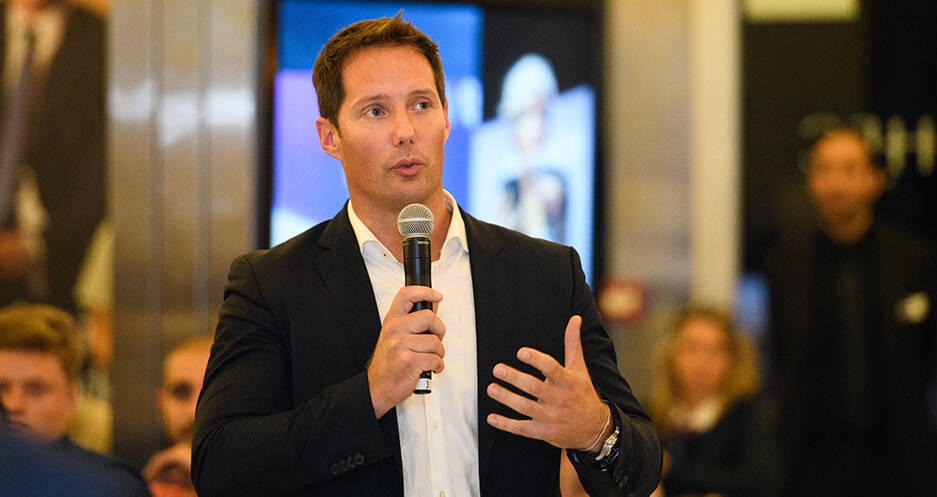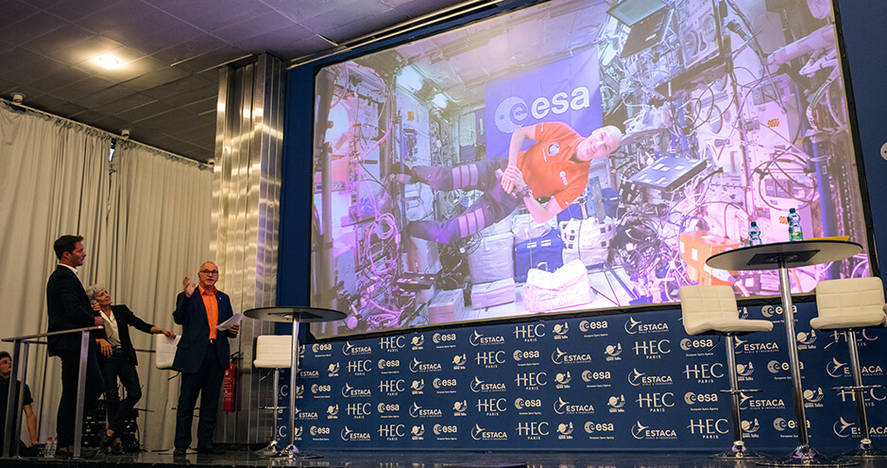Thomas Pesquet: Checking Earth’s Pulse
Despite his schedule as an astronaut for the European Space Agency (ESA), Thomas Pesquet spent five hours at the October 8 European Space Talks event, co-organized by HEC, ESA and ESTACA, to share his passion for space-related subjects with over 1,200 students, space entrepreneurs and specialists. Before this marathon exchange he shared his space vision with us.

What opportunities is space offering students in the 21st century?
The range of openings is unbelievable. It’s a reflection of the broad spectrum of activities we are involved in at ESA. Sometimes people forget the extent to which space is part of their everyday lives. This starts with the more mundane applications like satellite navigation, weather forecasts, communications, and so on. Then, there are the more essential - but perhaps more distant - fields. Let’s take our observations of Earth from space: by taking a step back and launching satellites we measure a huge mass of vital data. It allows us to reach far-reaching conclusions on the general state of the planet and its environment. Climate change is measured from space. So it’s hugely important and a big part of what we’re doing at ESA. We’re looking at Earth, checking its pulse and measuring all the data we gather.
Last but not least, we’re exploring. We’re going to where no one has been before, not just to plant a flag but to answer philosophical questions: where does life come from originally, for example? No one can answer that question for the moment. Sure, we know the ingredients but how did they arrive here in the first place? No one knows. Then, we ask if Earth can lose its atmosphere or liquid water? That’s what happened to Mars which used to be very similar to Earth. Nowadays, it’s a barren desert. These are questions we’re trying to solve by going deeper and further into space. And students are pivotal in this quest.
And how can HEC students contribute to such an adventure?
They have a huge contribution to make. This is not only a question for engineers. There is this deep misconception that there is only engineering and hardcore scientific work in space. That’s simply not the case! There are all kinds of jobs at ESA and in the space sector in general. Airbus, Thales and firms like that are always topping the list as ideal companies for young students. We need all of them. Take space law, for example: when we settle on the moon there will be plenty of different nations involved. How do we mediate between all of them? We don’t know yet but we certainly will have to invent regulations and laws to manage it all. So, there are all kinds of endeavors students like those at HEC will be vital for. That’s why I like space so much, it involves everyone aiming to forge a new world we all dream of.
Today is one of the highlights of European Space Talks, a four-month program created by ESA. 2019 also marks the landing of Apollo XI on the moon 50 years ago. How much would you say space has evolved in those five decades?
We’ve seen a quantum leap recently. But before that we didn’t see much coming from space research. We didn’t have all the applications I mentioned before which have become hugely important for everyday life. Everyone is holding a satellite navigator or satellite communications device in their hands and pockets nowadays. They don’t even notice anymore! What’s even more important to me is that we now understand a good deal more about Earth, we know how things really work. That is why we talk about climate change, something we didn’t do 50 years ago. Nobody could conclude scientifically on this crucial question because we didn’t have the data we have today. That’s is why I came here today to talk to the students, to involve them as much as possible and tell them what we discovered. We’re doing this for you but we also need you to take part in this adventure.
ESA is hoping to have a European astronaut on the moon by 2028. Your thoughts on this? A little bird told me you might be interested in the prospect…
(Laughs) We’d love to have a European on the moon. We will have a European on the moon at some point, it’s the next logical step. We want to return but in a more sustainable way to stay over longer periods of time and to perform and carry out highly ambitious scientific programs, not to just plant a flag on its surface. That’s not the spirit at ESA. Europe is going to be part of this, we’re already committed to this. We have in-house skills that the mission will need and I hope to have one – or several – of us walking on the moon.
Then, in 20-25 years we’ll tackle Mars, who knows?

